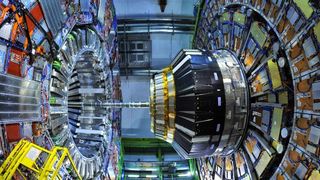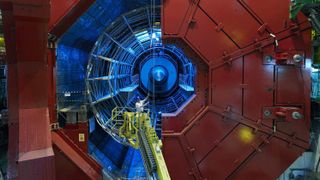Large Hadron Collider scientists hail most powerful collisions ever as detector gets back to work
The famed particle-smasher reignited after years of technology upgrades.

The Large Hadron Collider (LHC) is back and smashing particles at higher speed than ever before, exciting scientists with its upgraded potential.
The Large Hadron Collider is the world's longest and most powerful particle accelerator, zipping subatomic particles through a 17-mile-long (27 kilometer) loop underneath Geneva at speeds nearing that of light. Already the collider has led to some 3,000 scientific papers since beginning operations in 2010; now, with new upgrades, it's poised to showcase new insights, team members say.
"It's a magic moment," Fabiola Gianotti, Director-General of the European Organization for Nuclear Research (CERN), said during a press conference held on Tuesday (July 5) after the facility's new science run began. "We just had collisions at an unprecedented energy of 13.6 tera-electron volts, and this opens a new era of exploration at CERN," Gianotti added.
Increased energy, more collisions and better data collection practices may allow scientists to learn more about the subatomic world, perhaps even surpassing the Standard Model of particle physics.
"We really hope that we're going to collect something like 10 times as much data in this next run as we collected before, so hopefully, we can see a whole range of new phenomena," Chris Parkes, a spokesperson for the LHCb experiment, said in the same press conference.
LHCb seeks to study differences between matter and its mirror, known as antimatter, by studying the "beauty quark" (or b quark) particle. Parkes noted it took 15 years of planning to get this far, which means that finally operating the upgraded detector "is a really exciting time."
Get the Space.com Newsletter
Breaking space news, the latest updates on rocket launches, skywatching events and more!

Patricia McBride, spokesperson for the Compact Muon Solenoid detector at CERN, told reporters that the hope is to see "lots more Higgs," referring to the Higgs-Boson scientists at last discovered almost exactly 10 years ago using LHC. The so-called "God particle" predicts the mechanism that gives rise to mass and is fundamental to subatomic physics and the Standard Model.
McBride said the upgraded LHC will "be able to do precision measurements to understand what the Higgs is, what it's telling us about nature." The pivot to using Higgs in this way is "really exciting," McBride added, as "now we're actually using it as a tool to look for new physics."
Uncovering these new insights with Higgs will be helpful to studies of the universe at large, Gianotti said: "It's a very special particle with very special properties, which brings new interactions. In some sense, [Higgs] is related to many open questions related to, for instance, the evolution of the universe [and] to even its fate."
While discovery schedules are unpredictable, Gianotti said the "dream scenario" would be LHC at last uncovering the elusive nature of dark matter, which constitutes much of the known universe but cannot be directly seen with conventional instruments. (Accurate measurements of dark matter are key in predicting the expansion of the universe, among other things.)
Follow Elizabeth Howell on Twitter @howellspace. Follow us on Twitter @Spacedotcom and on Facebook.
Join our Space Forums to keep talking space on the latest missions, night sky and more! And if you have a news tip, correction or comment, let us know at: community@space.com.

Elizabeth Howell (she/her), Ph.D., is a staff writer in the spaceflight channel since 2022 covering diversity, education and gaming as well. She was contributing writer for Space.com for 10 years before joining full-time. Elizabeth's reporting includes multiple exclusives with the White House and Office of the Vice-President of the United States, an exclusive conversation with aspiring space tourist (and NSYNC bassist) Lance Bass, speaking several times with the International Space Station, witnessing five human spaceflight launches on two continents, flying parabolic, working inside a spacesuit, and participating in a simulated Mars mission. Her latest book, "Why Am I Taller?", is co-written with astronaut Dave Williams. Elizabeth holds a Ph.D. and M.Sc. in Space Studies from the University of North Dakota, a Bachelor of Journalism from Canada's Carleton University and a Bachelor of History from Canada's Athabasca University. Elizabeth is also a post-secondary instructor in communications and science at several institutions since 2015; her experience includes developing and teaching an astronomy course at Canada's Algonquin College (with Indigenous content as well) to more than 1,000 students since 2020. Elizabeth first got interested in space after watching the movie Apollo 13 in 1996, and still wants to be an astronaut someday. Mastodon: https://qoto.org/@howellspace
